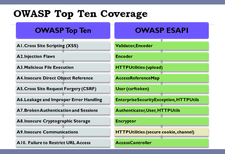ESAPI 1.4: Security Methods for the Web
The Enterprise Security API (ESAPI), a set of documentation focusing on application software security, has released a new version 1.4. Javadocs were updated and old interfaces were replaced.
ESAPI is a product of the Open Web Application Security Project (OWASP). The organization collects expertise on securing web applications, holds conferences and develops tools such as the WebScarab HTTP/S analysis proxy. OWASP members range from small consulting firms and security providers like Symantec to industry giants like IBM and Microsoft.
ESAPI describes methods that a typical web app needs for security. These methods include fixing authentication and protecting against cross-site scripting (XSS), cross-site request forgery (XSRF) and SQL injection. Other methods address failure to restrict URL access, insecure communications and improper error handling. The project publishes a Top 10 list of the most serious web app vulnerabilities.

The ESAPI project recommends that developers shouldn't continue to reinvent the security wheel for each application, but base their efforts on OWASP's expertise gained "over a decade of code review and penetration testing of critical enterprise applications."
The API is virtually independent of operating system and programming language, even though the current reference implementation is written in Java along with its Javadoc. Versions for .NET and PHP are planned.
ESAPI's Java implementation requires Java 1.4.2, but Java 1.6 users can uncomment code to make it work for them. The reference implementation is in binary JAR format for downloading. Developers will then have a forum in the OWASP-ESAPI mailing list.
Subscribe to our Linux Newsletters
Find Linux and Open Source Jobs
Subscribe to our ADMIN Newsletters
Support Our Work
Linux Magazine content is made possible with support from readers like you. Please consider contributing when you’ve found an article to be beneficial.

News
-
Two New Distros Adopt Enlightenment
MX Moksha and AV Linux 25 join ranks with Bodhi Linux and embrace the Enlightenment desktop.
-
Solus Linux 4.8 Removes Python 2
Solus Linux 4.8 has been released with the latest Linux kernel, updated desktops, and a key removal.
-
Zorin OS 18 Hits over a Million Downloads
If you doubt Linux isn't gaining popularity, you only have to look at Zorin OS's download numbers.
-
TUXEDO Computers Scraps Snapdragon X1E-Based Laptop
Due to issues with a Snapdragon CPU, TUXEDO Computers has cancelled its plans to release a laptop based on this elite hardware.
-
Debian Unleashes Debian Libre Live
Debian Libre Live keeps your machine free of proprietary software.
-
Valve Announces Pending Release of Steam Machine
Shout it to the heavens: Steam Machine, powered by Linux, is set to arrive in 2026.
-
Happy Birthday, ADMIN Magazine!
ADMIN is celebrating its 15th anniversary with issue #90.
-
Another Linux Malware Discovered
Russian hackers use Hyper-V to hide malware within Linux virtual machines.
-
TUXEDO Computers Announces a New InfinityBook
TUXEDO Computers is at it again with a new InfinityBook that will meet your professional and gaming needs.
-
SUSE Dives into the Agentic AI Pool
SUSE becomes the first open source company to adopt agentic AI with SUSE Enterprise Linux 16.
